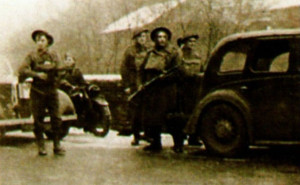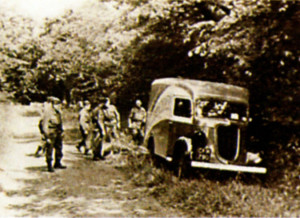
Propaganda films at the local Empress Cinema showing the exploits of British Commandos during the dark days of the Second World War enthused four schoolboys in the Peak District village of Chinley to form ‘His Majesty’s Cycle Rangers’ in 1941 – ‘Major’ Clowes and ‘Lieutenant’ Bennett, both 14, and two privates, the boys’ younger brothers.
Armed with low-powered air pistols and catapults, and wearing home-made ‘CR’ armbands over their shirt sleeves, they-roamed the village lanes and made their headquarters in an old disused stone bam in a field overlooking a railway line.
There were few targets for the boys on their cycle rides during the warm summer of 1941, but
the lads were suddenly presented with a chance to show their mettle when a Home Guard exercise was mounted.
The part-time soldiers of Chinley co
mprised elderly men and much younger ones awaiting their call-up. At first they had been termed ‘Local Defence Volunteers’, and in a bid to resist a possible German invasion of
Britain in 1940 volunteers who could fire a rifle or shotgun were asked to report for duty for ten hours a week. Each man received 20 rounds of ammunition, a palliasse, groundsheet and three blankets. On Winston Churchill’s instruction, the LDV volunteers were renamed Home Guardsmen injuly of that year.
On this particular quiet Sunday morning the Chinley Home Guard set up road blocks and checked motorists’ identity cards as they prepared to resist an ‘invasion’ by a platoon of fellow Home Guards from the nearby village of Hayfield.
Unfortunately a bad-tempered farmer saw the invading troops crawling along in the shadow of a hedgerow on his land. He waved a suck furiously and ordered them to leave. “We can’t,” hissed the officer in command. “If we stand up we’ll be seen by the men in Chinley.” With as much dignity as he could muster, he added: “In any case, this is a military exercise.”
The farmer wasted no more time. Out of a shippon he led his large dairy bull and turned it loose in the field. The Home Guardsmen may well have been prepared to face German paratroopers, but a snorting bull was a rather different kettle of fish. They swiftly rose to their feet and scrambled to safety in the nearby lane. They were spotted immediately by members of the Chinley platoon, who waved a green flag jubilantly.

At that moment the Cycle Rangers rode past. Sergeant Fred Gould, a tall, brawny gamekeeper from a moorland estate at Hayfield, stepped into the lane. He handed ‘Major’ Clowes a scribbled note reading: “We surrender”. The Cycle Rangers pedalled down to Chinley and proudly handed it to the first Home Guardsmen they met.
“Well done, lads!” said a beaming Sergeant Fox, of the Chinley platoon. “We’ve beaten the enemy. Come and join us!” He accompanied the four lads as they pushed their cycles to a grocer’s van from which two WVS ladies were dispensing cups of tea and cocoa to the troops and boys.
The Battle of Chinley was over, and some time later, when school exams loomed, the Cycle Rangers disbanded. They had enjoyed at least one moment of glory!
Peter Clowes








